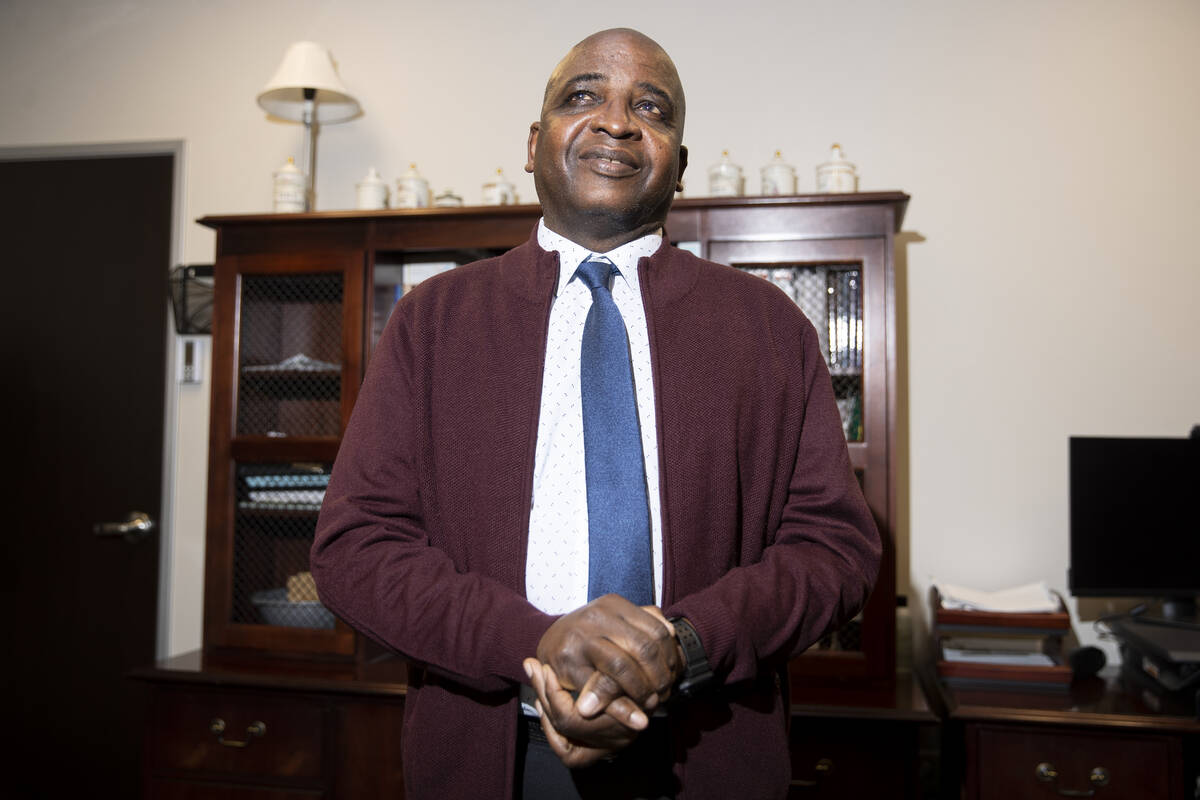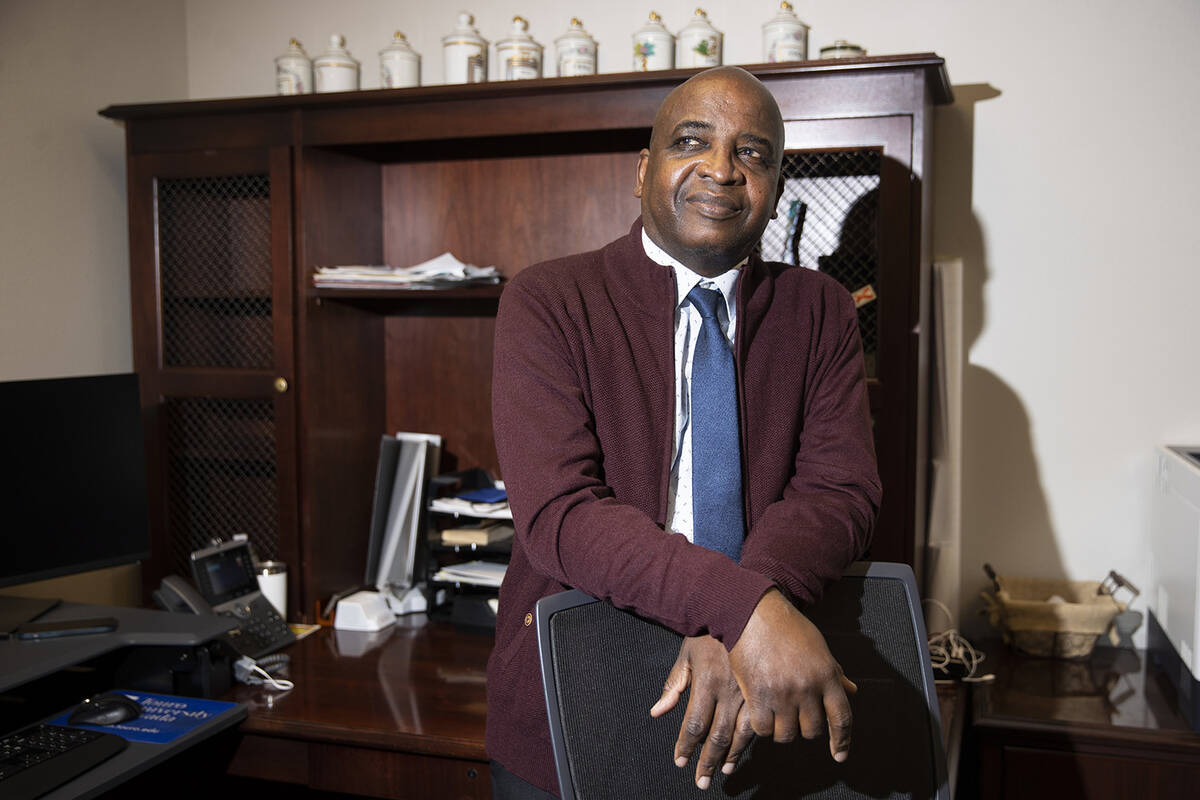Las Vegas doctor who fled Cuba now in health district’s top spot
Dr. Fermin Leguen has the heart of an adventurer, a useful attribute for the leader of a metropolitan public health agency during a pandemic.
The son of a Havana taxi driver, Leguen, who today leads the Southern Nevada Health District, left Cuba, where he was under increasing surveillance, to give a public health lecture in Spain. He would not return to his native country for eight years, and then only for a visit.
Leguen had obtained his medical degree from the University of Havana, worked in government social services in the Cuban countryside for two years and completed his medical residency in public health. He had worked as a vaccination consultant in Ethiopia and at a medical research institute in Havana.
After fleeing Cuba in 1991, Leguen stayed with friends in Spain for several months. With the help of an uncle in Florida, he obtained a visa to come to the U.S., where he found work at a Miami hospital as a telemetry technician monitoring cardiac-equipment readings. After a year, he moved to New York, where he had a relative, to pursue opportunities in public health.
He was accepted into a pediatric residency program in Puerto Rico. After a year there, he was accepted into Johns Hopkins University’s preventive medicine program, where he completed a master’s degree in public health.
He returned to Miami, where he worked in private practice and held leadership positions in both county and state health departments.
He also served as a vaccination consultant in Jamaica and in his wife’s native Peru. The couple have three children.
Leguen — pronounced le as in leg, gen as in again — joined the Southern Nevada Health District as chief medical officer in 2016. In the fall of 2019, he was named acting chief health officer, the agency’s top position. During the pandemic, the top spot — now referred to as district health officer — became his permanently.
In a wide-ranging interview, Leguen, 68, reflected on the journey that took him from Havana to Las Vegas, the challenges he has faced and what the future might hold.
Why did you leave Cuba?
“At the time I decided to leave Cuba, I had concerns. I felt intimidated,” said Leguen, who speaks with a heavy Cuban accent.
His work job at a Havana medical research institute put him into contact with visiting students from Spain. His friendships with these foreigners made the Cuban government suspicious, he said.
The institute “was one of the places that was submitted to heavy surveillance in terms of the security forces,” he said. “They had a security person assigned to kind of monitor everybody’s behavior at the site. … The Cuban government used to be very concerned at the time if you had any friendships with somebody who was not Cuban. It was a tense situation.”
Has being a Black man from Cuba created obstacles in your career?
“The answer to that question depends on how the person looks at the world in front of them. Honestly, I don’t look at the world in black and white. Most of the times when I attend the meetings — whether it is here in Nevada, or was in Florida or in New York — most of the time, I’m just the only Black person in the room, or myself and somebody else.
“It doesn’t intimidate me. So it doesn’t create a barrier for me to try to achieve what I’m trying to achieve.
“My professional experience here in Clark County, honestly, I haven’t felt that my race or my Spanish heritage have been a barrier or have encouraged anyone to try to limit the things that I would love to do.”
Has your background helped you professionally?
Being a Spanish speaker has helped open a door to the large Hispanic population in Clark County, Leguen said.
“It has helped me reach out to that segment of the population. It has helped me meet more representatives of that community. Many people from that community have reached out to me — asking questions, for assistance — and that has opened the door for our organization to be able to deliver some services to segments of that community.
“The same thing, by being Black, it helped me in my communication with the African American community, as well, at least in making them feel easy in their approach that they have toward me or that I have with them. So they don’t feel like there’s any room for rejection or minimizing their needs.”
How did the health district address low vaccination rates in minorities?
“The main reason that there were low rates of vaccination among minorities at the beginning of the vaccination campaign in Nevada was because of the design of the vaccination campaign itself. At the beginning, the vaccination campaign was based on occupational levels, and the priority occupations mostly are staffed by no minorities. So that certainly has an impact on this.
“As soon as the vaccination campaign opened up to all age groups, or most age groups, then we started to see a positive impact in that gap with minorities. Now, still, we did a lot of work in terms of trying to (bridge) that gap,” he said, through outreach to Hispanic, African American, Asian, Pacific Islander, Ethiopian and other communities.
“We also consider that one of the areas where this organization needs to improve in the long term is actually having an employee community that reflects the Clark County metro area. We don’t have that today. That also is something that is very helpful in every activity that we do.”
What has been one of your biggest challenges during the pandemic?
“I would say the biggest challenge is how to respond to the needs of the community without hurting your employees. You have to keep a high level of awareness, in terms of the physical (and) mental health of your staff. You cannot just blindly agree to requests from everybody without giving consideration to how tired, how (burned-out), your staff is.”
Leguen said he deals with frequent requests from elected officials and other community representatives for employees to staff weekend vaccination, testing and screening events.
“This is a positive thing. The problem is, now you have to ask people who maybe last weekend were participating in something similar to that and didn’t have any day in between to recharge. And now you’re asking them to come to this event.”
What is the biggest challenge moving forward?
“For me, the biggest challenge today, more than the pandemic, is the period after the pandemic. And the reason for that is because public health has been underfunded historically. Because of the pandemic, we have received a lot of funding from the federal government that has helped us respond to the pandemic.”
Federal funding has allowed the agency to hire more staff to provide additional services, he said.
“Once the pandemic is gone, our expectation is that most of those funds also will go away. And then what will happen is that the organization will go to a situation where it will be with very limited funds and resources. And that’s going to be a nightmare, not just for Southern Nevada Health District but for most local public health departments and, most likely, state departments as well.”
Would you ever move back to Cuba?
“I consider myself 100 percent Cuban. But when I’m there, I don’t think people see me that way. Also, you have to kind of re-educate yourself about behaviors and social values and things that have changed. … I would love to have a house or something in Cuba, where I could go and spend weeks or months. But I don’t think I can say I’m going to live in Cuba.”
Do you consider yourself a little bit American?
“There is no dichotomy there. You could be 100 percent Cuban, and you could be 100 percent American.
“What I mean by that is, I keep my Cuban values, I keep my Cuban culture. And still I’m American. By being 100 percent Cuban, you are not denying the values of America or why you are in America.”
Contact Mary Hynes at mhynes@reviewjournal.com or 702-383-0336. Follow @MaryHynes1 on Twitter.



















